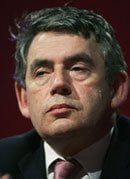The Tory victories in the local elections on May 1st
mean that the Conservatives will almost certainly go on to win the next general
election and form the next government. Theoretically the Labour leadership
could turn the situation round, but they seem incapable of changing their
disastrous course. New Labour is in meltdown.
The results are as bad as any in forty years, since 1968. In
that year, as a result of the disappointments of the right wing Harold Wilson
Labour government, Labour was reduced to controlling just 13 boroughs.
Accrington went Tory. Hackney went Tory. Of course the Tories won the general
election in 1970.
 In May 2008 Labour lost another 331 seats, starting from a
In May 2008 Labour lost another 331 seats, starting from a
very low base, since there had been losses in local elections for 11 years
past. The Tories picked up 256 seats. New Labour, the governing party, is
actually in third place in the polls with just 24% of the popular vote. The
LibDems are ahead on 25% and the Tories are in the lead with 44%. These results
suggest a Tory landslide victory of over 100 seats. The Conservatives made
gains North, South East and West – winning Bury, Harlow, Maidstone and North
Tyne. Labout managed to lose heartlands such as Merthyr Tydfil, Blaenau Gwent,
Torfaen, Caerphilly and Sunderland.
Why has it come to this? Many Labour activists and dissident
MPs – and there are a lot more dissidents now they realise their seats are not
safe – blame Gordon Brown. Gordon Brown has been Prime Minister for just ten
months. A sure way to reduce him to burbling incoherence is to ask him what his
‘vision’ is. He can’t answer. But if he doesn’t know what his government is
for, how is the electorate supposed to guess?
This is not just a personal failing on Brown’s part. This is
the heritage of New Labour, founded by Blair and Brown. They felt that
elections were won and lost, not by the votes of millions who have voted Labour
all their lives, but by a handful of swing voters in marginal constituencies.
So Brown has to guard his tongue. Nobody knows what he stands for because he
stands for no principle.
It should be remembered that Blair left office as a
shop-soiled, despised figure. Brown at first experienced a bounce in the
opinion polls since he was seen as uninvolved in the Blair era of lies and
spin. The popularity bounce collapsed when he threatened to call an election
and then changed his mind because polls revealed he might lose. He too was
identified as another devious spinmeister from the New Labour factory. But
Brown’s dithering and burbling comes because his government is in crisis.
Others see Labour’s unpopularity as down to the abolition of
the 10p rate of tax. This means that 5 million low paid workers on less than
about £18,000 will lose out. Though implemented in April, abolition was
announced in Gordon Brown’s final 2007 budget. Brown now claims that he had no
idea it would attack the low paid. This seems unlikely. Brown is a ferocious
micro-manager who supporters claim has ‘a brain the size of Asia’. If it really
is true he did not realise abolition would hurt the poor, then he is too stupid
to be Prime Minister – or Chancellor of the Exchequer.
But scenes in the
House of Commons last year indicate that he was well aware that he was
penalising the poor in favour of the well-to-do – and that was why he did it. It
was all part of the New Labour agenda. Brown gloried in stealing the Tories’
clothes on the tax issue, regarding it as a masterpiece of strategy in
preparation for the next election (which never came).
In any case there were voices that warned of the
consequences of the abolition of the 10p rate. Left wing Labour MP John
McDonnell explained exactly what would happen. And then? And then, when Blair
resigned and the opportunity for John McDonnell to challenge Brown in a
leadership contest arose, the unthinking cattle in the Parliamentary Labour
Party allowed themselves to be bullied by the thuggish whips into nominating
Brown in such numbers that Brown was ‘crowned’ without a contest. So Brown
became Prime Minister without a single person voting for him. Now the
backbenchers, fearful for their precious seats, pathetically whine in the
lobbies about Brown’s alleged psychological flaws and political failings. They
have themselves to blame.
Then there’s the economy. Voters have become uncomfortably
aware that the good times are now at an end. Recession is closing in. We
haven’t seen the worst of it yet. That is not why electors are angry with New
Labour. They are angry because for eleven years Brown’s mantra has been ‘no
return to boom and bust.’ He has lied, claiming responsibility for a boom that
was happening anyway and was nothing to do with government policy. Everybody
can see he lied.
Now he doesn’t want to claim responsibility for the bust. In
fact New Labour is powerless against the rhythms of global capitalism, since
they are determined to take no action against the system. People know this
government will do nothing to protect them from hard times. Quite simply, New
Labour has been rumbled by the electorate.
Will there be a leadership contest? One of the symptoms of
the crisis in the ranks of the Labour Party is that the PLP is awash with
rumour and plotting. The problem is to come up with a credible alternative to
Gordon Brown. One of the features of New Labour’s rule is that Parliamentary
candidates have been ferociously vetted to weed out any signs of independence.
Backbenchers are engaging with their pagers rather than their brains, terrified
of being ‘off-message.’ Unelected enforcers have imposed the will of the Prime
Minister’s office upon the Parliamentary Party. As a result the PLP and the
Cabinet are packed with talentless mediocrities. Who in the Cabinet would
really pose a serious alternative to Brown? We would support a contest and
support John McDonnell if he stood. But we remember that the PLP stole our
right to elect the leader last year.
In London Ken Livingstone was caught in the slipstream of
New Labour’s unpopularity. After the second preference votes were counted, he
lost by 47% to 53% to the hard right old Etonian Tory, Boris Johnson.
Livingstone did not do enough to differentiate himself from the government. In
his campaign he stood on his record as an experienced administrator and
incumbent against Johnson, who argued for some sort of change.
Ken has always done better when he has stood as his own man.
In the 1980s as leader of the Greater London Council he mounted some kind of
resistance to Thatcher, and won credit for it. In 2000 he stood up to the
bullies in the New Labour machine, stood as an independent against the official
Labour candidate, gave him a good thrashing in the polls, and emerged as Mayor.
Ken lists his hobbies as breeding newts and socialism. He could have won if he
had put the second hobby as part of his job description.
The London elections show how the ruling class is now
swinging behind the Tories. After all, what use is New Labour to them now? A
wall of money, at least £1 ½ million stood behind Boris Johnson’s campaign. The
role of the ‘Evening Standard’, London’ only paid-for evening paper was
crucial, running headlines such as, “Suicide bomb backer runs Ken campaign”
night after night. Even those of us who would not wipe our cat’s bum on the
‘Evening Standard’ found it difficult to miss the 500 billboards screaming at
everyone in the capital. The ‘Standard’ has another angle. As part of the
‘Daily Mail’ group their monopoly franchise on dishing out the free ‘Metro’ to
Londoners on their way to work comes up for review in 2010. No doubt Johnson
will be more amenable to renew than Livingstone. After all, they’ve been
scratching his back…
The Fascist British National Party got a worrying 2.84% in
London, and a seat in the London Assembly, though they were marginalised
elsewhere. It is possible that their second preference votes turned the trick for
Boris in the Mayoral race.
New Labour has
abandoned the poor. There seems no let-up in their handouts and concessions to
big business. They have learned nothing from their bloody nose, in which case
they will stagger on to defeat at the next elections.
The New Labour ‘agenda’ was consolidated after 1992, when
Labour had lost their fourth successive general election. They created the myth
that Labour had lurched so far to the left in the 1980s as to be unelectable.
We have unpicked that myth [See:
Labour – how the right wing gained control].
They claimed that Labour had to ‘triangulate’ in order to win. Labour had to
imitate Tory policies and echo their prejudices in order to win over swing
voters in marginal constituencies. Forget the poor, forget the working class!
Their vote is in the bag anyway.
But under New Labour the Labour vote in the polls has sunk
lower than the previous low point of 1983. The catastrophic results of 1968 and
2008 have been ‘achieved’ when the right wing was in complete control of policy
and the Party. The message is clear – New Labour loses elections.
The reason for the
disaster in the polls is mass working class abstentions in previously solid
Labour areas. Workers see no reason why they should walk a few yards to vote
for a government that has abandoned them. The middle of the road Labour think
tank ‘Compass’ has declared, “New Labour is dead.” We knew it was all based on
spin, on denying every principle the Party had originally been set up to
defend. But they told us it was the only way to win elections. Now we see New
Labour has led us into a dead end. It’s time to reverse!
It is natural that under New Labour leadership,
workers react in disgust, abstain and turn against Labour. But older workers
remember; whenever Labour voters abstain in droves, the Tories sense that we
are weak. They come in and put the boot in to the working class. If the Tories
win, young workers will quickly learn that lesson too. What is needed is to
begin the fight to reclaim the Labour Party from the hijackers now.






